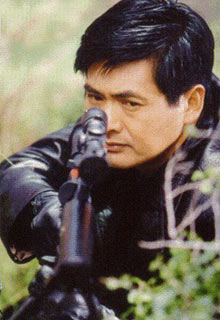| Tools: Save | Print | E-mail | Most Read |
| Action Hero Takes a Break |
| Adjust font size: |
Chow Yun-fat is known internationally as "a charming but tough matchstick-chewing hero." However, as Xu Wei reports, he has wanted to try something different and his latest role as a middle-aged fan of Peking Opera who has a hazardous love with "aunt" is certainly different. Veteran So with his latest character - a middle-aged Peking Opera fan in "I learned to study every tiny change in emotion and mood for this movie," says the 50-year-old who rose to international fame in Ang Lee's Oscar-winning blockbuster Crouching Tiger, Hidden Dragon. Wearing a sporty hat and casually dressed, Chow greeted the press with his signature charming grin and said he had just wrapped up shooting in the city. And his bubbling enthusiasm reveals his satisfaction with the change of pace which marks a departure from straight-forward action roles to characters with complicated emotions. In the movie, Chow has a dramatic and hazardous love affair with the "aunt" - an elegant lady played by veteran Chinese mainland actress Siqin Gaowa. But the secret romance, full of black humor, ends in tragedy.
The script was written by Li Qiang, who made his screenwriting reputation with the acclaimed art-house movie Peacock, a Silver Bear winner at the 2005 Berlin International Film Festival. "I am concerned about the fate of ordinary people in the contemporary world," says Li. "They blindly believe they can control their lives but in many situations they are so helpless and unable to take charge of their destinies." Director Hui, whose filmography covers a variety of genres going back to the late 1970s, is adept at showing the human emotions under stress. "I'm trying to present a bitter-sweet film in a 'post-modern' way," Hui says with a smile. She says the hilarious grotesquery and true-to-life details of the plot will merge harmoniously in the picture. The movie, which is scheduled to finish post-production in April, is also a new collaboration between Chow and Hui, 21 years after Love in a Born poor on Having quit high school, Chow, at the age of 17, applied to TVB Studios - By the 1980s, the lanky good-looking young actor had showcased his skills in a handful of TVB classics such as Action movies However, the star of 70 films squandered his talent with some of his early film choices until his first collaboration with Hui in the acclaimed movie The Story of Woo Viet (1981). Later, he teamed up with director John Woo in making "heroic bloodshed" action movies such as A Better Tomorrow (1987), The Killer (1989) and Hard Boiled (1992). The films had great success at bod offices across asia and estabished Chow as a chariming but tough stick-chewing hero. In the late 1990s, Chow became the first Hong Kong actor to break into Though his first two films Replacement Killers (1998) and The Corruptor (1999) were box-office sleepers, he broke through with Anna and the King (1999), co-starring Jodie Foster, and Crouching Tiger, Hidden Dragon (2000). "Chow first made his name known as gangster Hui Man-keung in the popular serial Shanghai Tan (The Bund)," says Zhang Jian, a fan of Chow's movies. "Though his Hollywood career is not doing very well, partly because most Asian actors are given specific stereotyped roles, the cool man with beautiful eyes is a great actor in After Peace Hotel (1995), Chow was absent from In those scenes, Chow not only had to practice his raw Mandarin but also to play in several Peking Opera episodes with Siqin. "He is amiable and gentle to everybody on the set," says Chinese mainland actress Zhao Wei who plays a rough and funny Northern Chinese girl in the film. Chow has had the enviable opportunity to co-star with Hollywood megastar Johnny Depp in the latest sequel to Pirates of the But the modest Chow simply believes that it is the director who plays the main role in moviemaking - the actors are "workers" who follow the director's requirements. "For me, shooting films and breaking into Perhaps for the charming "god of gambling," life is a gamble, too. (Shanghai Daily December 31, 2005) |
| Tools: Save | Print | E-mail | Most Read |
 |
| Related Stories |
|
|
Product Directory China Search |
Country Search Hot Buys |
